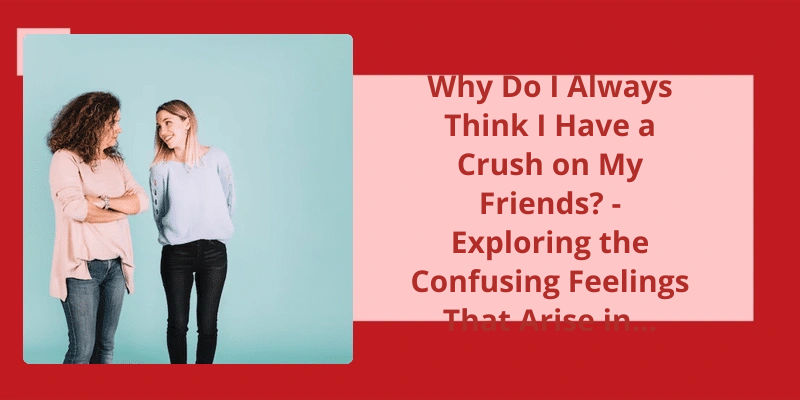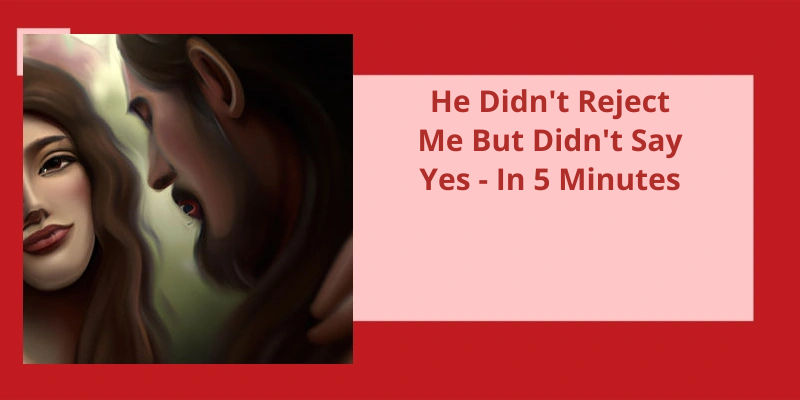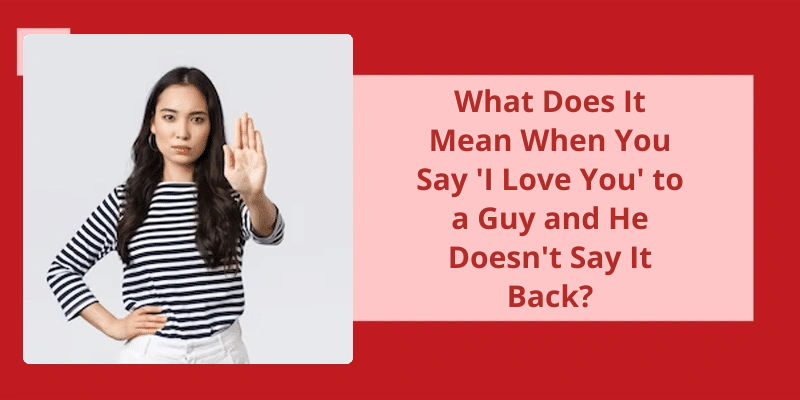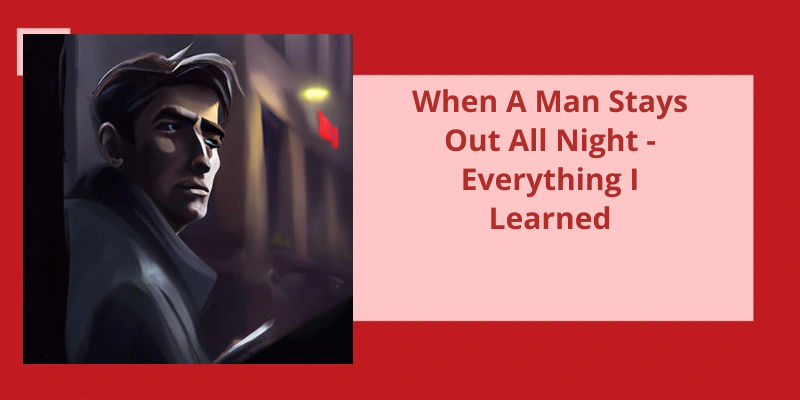Human beings are social creatures by nature, and as a result, we often develop close relationships with the people around us. It isn’t uncommon for individuals to develop strong feelings of admiration and fondness towards their friends. However, these feelings can often be confused with romantic attraction, leading individuals to question why they always seem to have a crush on their friends. The answer lies in the Reward Theory of Attraction, which suggests that our unconscious mind prioritizes relationships that make us feel good. As we spend more time with and get to know our friends better, positive experiences begin to create an emotional attachment that can often be confused with romantic attraction. In short, it’s simply the natural way in which our brains operate.
Why Do I Think I Have a Crush on Someone?
Crushes can also be a result of our unconscious desires and fantasies. This is why we often crush on people who’re unattainable, such as celebrities or people who’re already in a committed relationship. These fantasies allow us to escape from our mundane reality and imagine a relationship that’s exciting, passionate and fulfilling. It’s important to note that crushes don’t always lead to love or a long-term relationship. In fact, many crushes are simply a passing phase and disappear over time.
Physical attraction is often the first thing that draws us to someone, followed by a desire to get to know them on a deeper level. Sometimes, an emotional connection develops first and then physical attraction follows. People we’ve crushes on often possess qualities that we find desirable, such as intelligence, a good sense of humour, confidence or a kind heart.
Another reason why we develop crushes on people is because of shared experiences or common interests. When we meet someone who shares our passions and interests, we feel a sense of connection and can relate to them on a deeper level. This can lead to admiration and eventually a crush. Similarly, someone who’s supportive, encouraging and understanding can also cause us to develop feelings of affection towards them.
It’s also important to approach crushes with a level head and not let them consume us or interfere with our existing relationships. By acknowledging and understanding our crushes, we can learn and grow from those experiences.
The Difference Between a Crush and Love
A crush is a short-term infatuation with someone, while love involves a deep emotional attachment and long-term commitment. Crushes are often based on superficial qualities, while love is built on a deeper connection and understanding of the other person. The intensity of a crush may fade quickly, whereas love can last a lifetime.
Navigating the line between friendship and romantic interest can be tricky, especially if you’re not quite sure what someone’s feelings are. Having a platonic crush on someone can be a confusing experience, as you’re drawn to their personality and character, but don’t have romantic or sexual feelings towards them. It’s important to be able to recognize the signs of a platonic crush, so that you can understand the dynamic and maintain the friendship without adding any unwanted complications.
How Do You Know if Someone Has a Platonic Crush on You?
When it comes to platonic crushes, the line can be blurry. It can be difficult to differentiate between simple admiration and romantic interest. However, there are definitely some signs to keep an eye out for. Firstly, if you find yourself agreeing with almost everything they say and appreciating their perspective on various topics, this could be a sign that you’ve a platonic crush on them. It’s natural to be drawn to people who seem to share your values and beliefs.
Another indicator can be checking their social media frequently. If you find yourself scrolling through their feed more often than usual and feeling excited to see what theyve posted, this could be a sign of a platonic crush. It’s natural to want to keep up with someone you admire and respect.
Additionally, valuing someones opinion highly can be a sign of a platonic crush. If you find yourself seeking their advice and input on various aspects of your life and valuing their perspective above others, this is a strong indication that you’ve strong feelings for them, albeit more platonic than romantic.
It’s possible to feel strongly about someone without wanting to get into their pants. It’s important to respect boundaries and recognize that not all crushes need to turn into romantic relationships.
The Difference Between a Platonic Crush and a Romantic Crush: This Topic Can Delve Deeper Into the Nuances of Platonic Crushes, How They Differ From Romantic Crushes, and the Signs That Can Help to Distinguish Between the Two.
This topic discusses the distinctions between platonic and romantic crushes, including their nuances and signs that can aid in identifying them.
Navigating the murky waters of friendships can be difficult, especially when you start to develop feelings that go beyond just simple platonic admiration. A friend crush is a unique kind of sentiment that often leaves people feeling conflicted and unsure of how to proceed. On one hand, you may feel incredibly drawn to this person and eager to spend more time with them. On the other hand, you may worry about ruining your existing friendship or coming on too strong. Whatever the case may be, understanding the nuances of a friend crush can help you navigate these complex emotions with greater ease and confidence.
What Does a Friend Crush Feel Like?
Instead of butterflies in your stomach, you may feel a warmth in your heart when you see them or hear their name. You may find yourself constantly thinking about them, wondering what their interests are, what their family is like, and what their hopes and dreams are. You may even daydream about spending time with them, laughing and having deep conversations.
However, unlike a romantic crush, a friend crush can sometimes be easier to navigate. You might not feel as anxious about impressing or wooing this person since there’s no pressure or expectation of romance. Instead, you can focus on forming a genuine connection, getting to know them as a person, and sharing common interests.
That being said, there’s still a risk of rejection or disappointment when it comes to a friend crush. If the other person doesn’t feel the same level of interest or admiration, it can be tough to move past those feelings without feeling embarrassed or ashamed. It’s important to remember that friendship is a two-way street and not everyone will be receptive or available to form that kind of connection.
It’s not uncommon for people to catch feelings for their friends. When you spend a lot of time with someone and develop a strong bond, it’s natural for your emotions to evolve. It can be challenging to navigate these new feelings, but there are steps you can take to handle the situation in a healthy and respectful way. Let’s take a closer look at why you might suddenly have feelings for your friend, and what you can do to manage them.
Why Do I Suddenly Have Feelings for My Friend?
It’s not uncommon for people to develop feelings for their friends, and there are a variety of reasons why this might happen. Sometimes, it’s simply a matter of spending a lot of time together and feeling a strong connection. Other times, it might be because you admire your friends qualities or find them physically attractive.
Regardless of the reason behind your feelings, it’s important to carefully consider your next steps. If you think your friend might feel the same way, it may be worth opening up and seeing if theyre interested in pursuing a romantic relationship. However, it’s equally important to be respectful if they don’t feel the same way or if theyre not interested in changing the nature of your relationship.
One of the biggest challenges when it comes to catching feelings for friends is navigating the transition from friendship to romance. If you do decide to pursue a relationship with your friend, it’s important to be clear and honest about your intentions and to establish boundaries together from the beginning. This can help ensure that both of you’re on the same page and that your friendship remains intact.
On the other hand, if you decide that you’d rather preserve your friendship and not pursue a romantic relationship, it’s important to respect your friends boundaries and avoid putting them in uncomfortable situations. You might want to take a step back from spending as much time together for a while, or you might need to have an honest conversation about your feelings and establish some boundaries so that you can move past them.
It’s not uncommon to have a crush on someone, but when it becomes an obsession, it can be a cause for concern. Many of us have experienced obsessing over a crush at some point in our lives, and the reasons behind it are complex. It’s a topic that’s been studied by researchers, and their findings suggest that there’s more to it than meets the eye. In fact, some have even likened it to addiction. Dr Gery Karantzas, an Associate Professor at Deakin University, sheds some light on what could be causing this behaviour.
Why Am I Obsessing Over a Crush?
This “reward” comes in the form of a release of dopamine – a feel-good chemical. The more we fantasise about our crush, the more dopamine gets released and the more addicted we become to that feeling of pleasure. This can create a cycle of obsession, where were always seeking that hit of dopamine.
Another reason why we might obsess over a crush is because it feels safe. When were in the early stages of a crush, we can control the situation by not revealing our feelings or risking rejection. We can indulge in daydreams and fantasies without actually having to make a move. This gives us a sense of security, as weren’t putting ourselves out there for potential hurt or rejection.
Our obsession with a crush may also be a way to distract ourselves from other stressors in our lives. Focusing our energy and attention on someone who makes us feel good can be a welcome relief from other worries or anxieties. It can also give us a sense of purpose or motivation to improve ourselves – we may strive to become the type of person our crush would be interested in.
However, excessive crush obsessing can also be a sign of issues with our self-esteem or attachment style. People who struggle with low self-esteem may seek validation or self-worth from the attention of someone they admire. Similarly, those with insecure attachment styles may cling to a crush as a way to fulfil their need for intimacy and connection, even if it’s in an unhealthy or one-sided way.
Ultimately, theres nothing inherently wrong with having a crush or even obsessing over someone to a certain extent. However, when our thoughts and behaviours become all-consuming, it’s important to take a step back and assess whether this is a healthy pattern. It’s important to remember that crushes and relationships should always be based on mutual respect and consent, rather than an unbalanced power dynamic fuelled by an addiction.
The Effects of Social Media on Crush Obsession and How It Can Intensify the Feelings
Social media can intensify crush obsession by providing constant access to the object of one’s affection, enabling comparison and competition with others, and fueling fantasies through curated self-representations. This can lead to unhealthy fixations and intrusive thoughts, potentially exacerbating mental health issues.
Now that we’ve discussed some common signs of having a crush, it’s important to remember that every individual experiences attraction differently. While some may find themselves exhibiting all of the aforementioned behaviors, others may not show any at all. It’s important to trust your own feelings and emotions when it comes to matters of the heart, rather than relying solely on external indicators.
How Do You Realize You Have a Crush?
When you’ve a crush on someone, it’s an exhilarating feeling that’s difficult to describe. You find yourself thinking about them constantly, daydreaming about what it would be like to be with them. You might get butterflies in your stomach when you see them, or feel a rush of excitement when they’re nearby. You might even start doing things specifically to get their attention, like dressing differently or hanging out in places where you know they’ll be.
Another sign that you’ve a crush is that you start doing things to get their attention. Maybe you wear your hair in a different way, or you try to make jokes to make them laugh. You might even start participating in activities or joining clubs that they’re involved with, just so you can be around them.
When you’ve a crush, you may also notice little details about them that you never would have noticed before. You might pay attention to the way they dress or the way they walk, or you might find yourself drawn to their sense of humor or their intelligence. These little details can become the focus of your thoughts and feelings, as you try to understand why you’re so drawn to this person.
One of the most frustrating parts of having a crush is feeling flustered or nervous around them. You might stumble over your words or become tongue-tied when you try to talk to them. You might even find yourself blushing or feeling self-conscious when they’re around. This can be both embarrassing and difficult to manage, but it’s a common experience.
Finally, you might find yourself trying to avoid the person you’ve a crush on. This might seem counterintuitive, but it’s a common response to the strong emotions that come with having a crush. You might feel overwhelmed or intimidated by your feelings, and so you might try to distance yourself from the person in question. However, this can make things even more confusing and difficult to deal with, as you try to figure out how to manage your emotions while still being around the person you like.
The Impact of Social Media and Technology on How People Develop Crushes and Communicate With Their Crushes.
- Social media allows people to easily connect with others and discover potential crushes.
- Technology allows for constant communication with crushes through messaging and social media platforms.
- This can lead to a false sense of intimacy and a lack of face-to-face communication skills.
- The impact of social media and technology on crushes varies from person to person and can have both positive and negative effects.
- It’s important for individuals to be aware of these impacts and to use technology and social media in a healthy and responsible way when it comes to developing crushes.
Conclusion
Additionally, the social context of our friendships can also play a role in the way we perceive our feelings towards our friends. Societal norms and expectations can influence our thoughts and emphasize the importance of romantic relationships. It's important to understand that having strong feelings for a friend doesn’t necessarily mean they’re romantic in nature and can be a result of the rewarding nature of the friendship. By acknowledging and examining our emotions, we can better understand and navigate our relationships with our friends. Ultimately, it's important to prioritize communication and respect in any kind of relationship, whether it be a platonic friendship or a romantic partnership.






